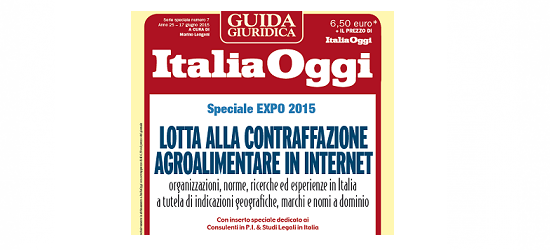
Edith Van Den Eede and Marilena Garis
Trademark Attorneys PRAXI INTELLECTUAL PROPERTY S.p.A.
Geographical Indications (“GIs”) in the agricultural and wine sector constitute a fundamental asset for the Made in Italy label; it is thus not surprising that there is no lack of imitations and counterfeit products, even on a national level. This despite the fact that the system protecting them is particularly vigorous and stronger than that offered by the Community and Italian regulations on trademarks, including collective marks, thanks also to the specific provision (with a direct effect at national level) which ensures that said indications are also protected against mere non-confusing evocation.
Some guidance on the protection of GIs from counterfeiting, including on the Internet, by later trademarks was given by two recent decisions of the Courts of Turin and Rome.
With its decision of 9 May 2014, the Turin Business Court held invalid, and illegitimate the use of, the mark GORGO CAPRA for milk products (class 29), on the basis of the protected designation of origin GORGONZOLA. The name GORGONZOLA indeed was entered into the Register of protected geographical indications (“PGIs”) in 1996 for a cheese made from pasteurised cow’s milk coming from the specific area of origin.
The Consorzio per la tutela del formaggio Gorgonzola had lodged a cancellation and infringement action against the owner of the Italian trademark registration for GORGO CAPRA, filed in 2010 for class 29 goods, on the basis of Articles 13 and 14 of the PGI Regulation No 510/2006. The defendant was using GORGO CAPRA and GORGO DI CAPRA for a round-shaped cheese that he described as a highly ripened “gorgonzola caprino” (“caprino” meaning “of a goat”, thus “goat’s milk gorgonzola”).
In the view of the Court, which in its decision cites the decisions of the European Court of Justice in the CAMBOZOLA and the PARMESAN Cases (Nos C-87/97 and C-132/05, respectively), the GORGO CAPRA mark clearly evoked GORGONZOLA since, like in the Cambozola case, the mark reproduces a part of the protected name and, as a whole, is composed of the same number of letters. In addition, the first element of the mark captures the immediate attention of the consumers so that – when confronted with a cheese named GORGO CAPRA – they would immediately and automatically think of GORGONZOLA.
Along the same lines, the Rome Court, in its preliminary injunction of 28 April 2014, held that the Italian mark MORO DI CAPALBIO should never have been registered in light of the prior recognition as a protected geographical indication of CABALBIO. In its ruling, the Court specifically refers to Articles 118l and 118m of EU Regulation No 1234/2007 establishing a common organisation of agricultural markets, regulating the relationship between GIs and trademarks.
Likewise, in the view of the Rome Court, the mark VERMENTINO DI MAREMMA cannot legitimately be used for wines not complying with the product specification of MAREMMA TOSCANA that has been protected as a traditional geographical indication since 10 October 1995 (and, successively, as a protected designation of origin, through a Ministerial Decree of 30 September 2011). According to the Court, PGIs are protected against “any direct or indirect commercial use for comparable products not complying with the product specification of the protected name, or in so far as such use exploits the reputation of a designation of origin or a geographical indication”.
With specific reference to counterfeiting on the Internet, the recent Study commissioned by the EU Commission – precursor of the upcoming EU Regulation extending the GI protection to non-agricultural products – suggested the inclusion in new legal instruments of an explicit provision aiming at protecting GIs when disputes arise on the registration of Internet domain names. As a consequence, the new regulation could specifically prohibit non right-holders to register domain names containing protected geographical indications, thus further strengthening the protection of the latter.
